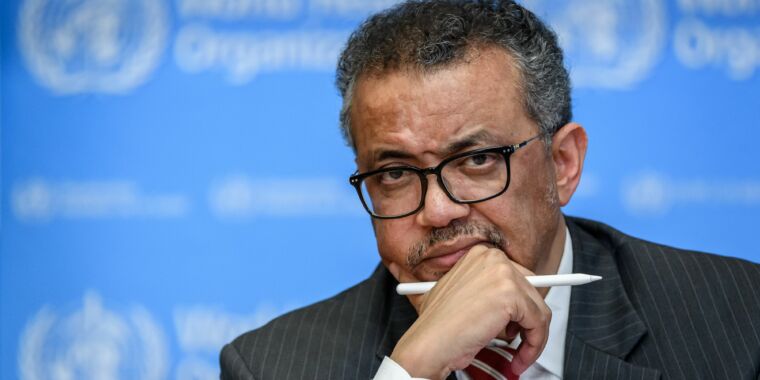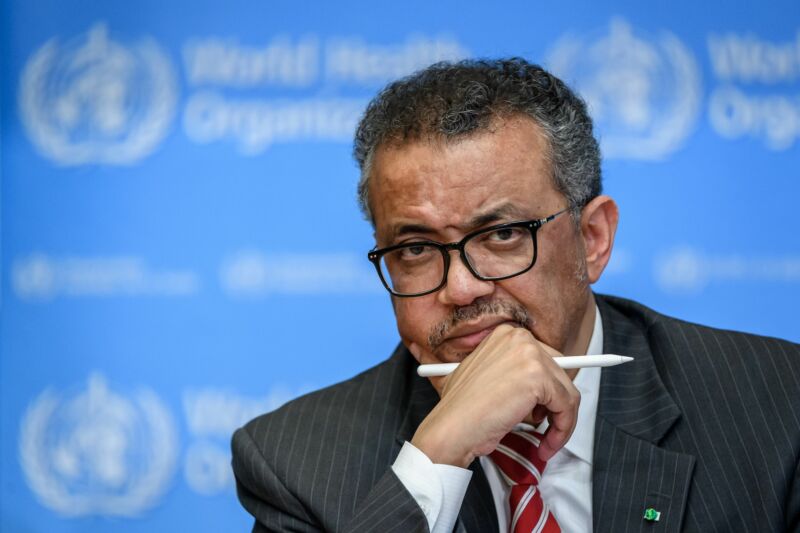
Bad move —
“When we are divided, the virus exploits the cracks between us.”

Enlarge / World Health Organization (WHO) Director-General Tedros Adhanom Ghebreyesus attends a daily press briefing on COVID-19, the disease caused by the novel coronavirus, at the WHO headquaters in Geneva on March 11, 2020.
The director-general of the World Health Organization called for global unity and continued focus on saving lives and fighting the common enemy, COVID-19, on Wednesday—a day after US President Donald Trump attacked the organization for allegedly “severely mismanaging” the pandemic response. Trump announced he would halt funding to the WHO until his administration reviewed its response.
The WHO, an agency formed in the 1940s by the United Nations and supported by its member states, receives around 15 percent of its funding from the United States.
“We regret the decision of the President of the United States to order a halt in funding to the World Health Organization,” WHO director-general, Tedros Adhanom Ghebreyesus (aka Dr. Tedros) said in a press briefing Wednesday. “With support from the people and government of the United States, WHO works to improve the health of many of the world’s poorest and most vulnerable people,” he went on.
In addition to fighting the COVID-19 pandemic, WHO is working on beating back polio, measles, malaria, Ebola, HIV, tuberculosis, malnutrition, cancer, diabetes, mental health, and many other diseases and conditions, he said. “We also work with countries to strengthen health systems and improve access to life-saving health services.”
It’s unclear how the loss of US funding will affect the organization’s various activities, particularly the ones dealing with the current global health crisis. The organization is now reviewing potential impacts and plans to work with partners to try to fill any necessary gaps to keep its work going, Dr. Tedros said in the briefing. He added that he will inform the press on the findings of the review and plans to address funding gaps when they are complete.
In an apparent response to Trump’s criticism over its handling of the pandemic, Dr. Tedros also noted that its member states and independent bodies will review its response to the pandemic “in due course.”
“No doubt, areas for improvement will be identified and there will be lessons for all of us to learn,” he said. “But for now, our focus—my focus—is on stopping this virus and saving lives.”
He urged everyone to do the same. “This is a time for all of us to be united in our common struggle against a common threat—a dangerous enemy. When we are divided, the virus exploits the cracks between us.”
United
The message is a familiar one for Dr. Tedros, who has made “solidarity” a constant slogan of the global public health response to the COVID-19 pandemic.
“Please quarantine politicizing COVID,” he pleaded in an April 8 press conference when asked about Trump’s previous criticism of the organization. “We will have many body bags in front of us if we don’t behave.” He added then: “When there are cracks at national level and global level that’s when the virus succeeds. For God’s sake, we have lost more than 60,000 citizens of the world.”
That figure has since more than doubled. As of April 15, there are more than 2 million cases worldwide and 133,000 dead from the novel coronavirus, which exploded out of China’s Hubei province less than four months ago. Now, the United States is the epicenter of the pandemic, with more than 632,000 cases and nearly 28,000 deaths.
With the globe now in the thick of a health and economic crisis, public health experts unanimously stood with WHO, chastising Trump’s attacks and funding halt.
That includes the head of the US Center’s for Disease Control and Prevention, Dr. Robert Redfield. In a Wednesday morning interview on Good Morning America, Redfield noted that “CDC and WHO has had a long history of working together in multiple outbreaks throughout the world, as we continue to do in this one. And so, we’ve had a very productive public health relationship. We continue to have that.”
He added that he’d “like to do the postmortem on this outbreak” but only “once we get through it together.”
Consistent criticism
Other critics were less diplomatic in their response to Trump’s attacks.
Dr. Peter Piot—who is the director of the London School of Hygiene & Tropical Medicine and a professor of global health—said the following in a media statement: “Halting funding to the WHO is a dangerous, short-sighted, and politically motivated decision, with potential public health consequences for all countries in the world, whether they are rich or poor.”
Robert Dingwall, a professor of sociology at Nottingham Trent University, added that “the freeze on funding for WHO by the US government is a typically petulant act against an international organization that has sought to maintain its integrity and impartiality rather than to bow to President Trump’s transient and volatile prejudices.”
“Let’s hope President Trump and the review team realize quickly that now is not the time for division and potentially weakening the UN authority on health who are busy coordinating the global response to the pandemic,” Dr. Gail Carson, Director of Network Development at ISARIC (International Severe Acute Respiratory and Emerging Infection Consortium) at the University of Oxford said. “Look at facts, and there is plenty evidence of all the good WHO has done during this pandemic.”
Joshua Moon, a senior research fellow at the Science Policy Research Unit at the University of Sussex Business School, said:
To see Trump threatening to pull funding from WHO in the middle of a pandemic is truly heartbreaking. The WHO has received so much criticism in the past decade surrounding its role in various public health emergencies. I have been one of those critics myself. However, this attack on WHO is a purely political move designed to distract and pander to Trump’s base.
At its core: the loss of US funding for WHO is a huge problem that will impact the response to COVID-19 globally, invite new and potentially unaccountable actors into the position of power that the US previous held, and is a contemptible falsehood being peddled by a politician who in my opinion is trying to hide his own mistakes from his supporters.
Stephen Griffin, a medical professor and expert at viral diseases at the University of Leeds, echoed the thoughts, saying, “This most recent intervention in public health policy by President Trump is perhaps one of the least productive, most short-sighted, self-motivated, and hypocritical acts I have ever witnessed. As far as I can ascertain, it has no foundation in reality.
“The situation in the US and the world over amounts to a crisis, and one in which we must stand together,” he went on. “WHO is perhaps one of the best means of achieving this and deserves the support and respect of all countries.”









